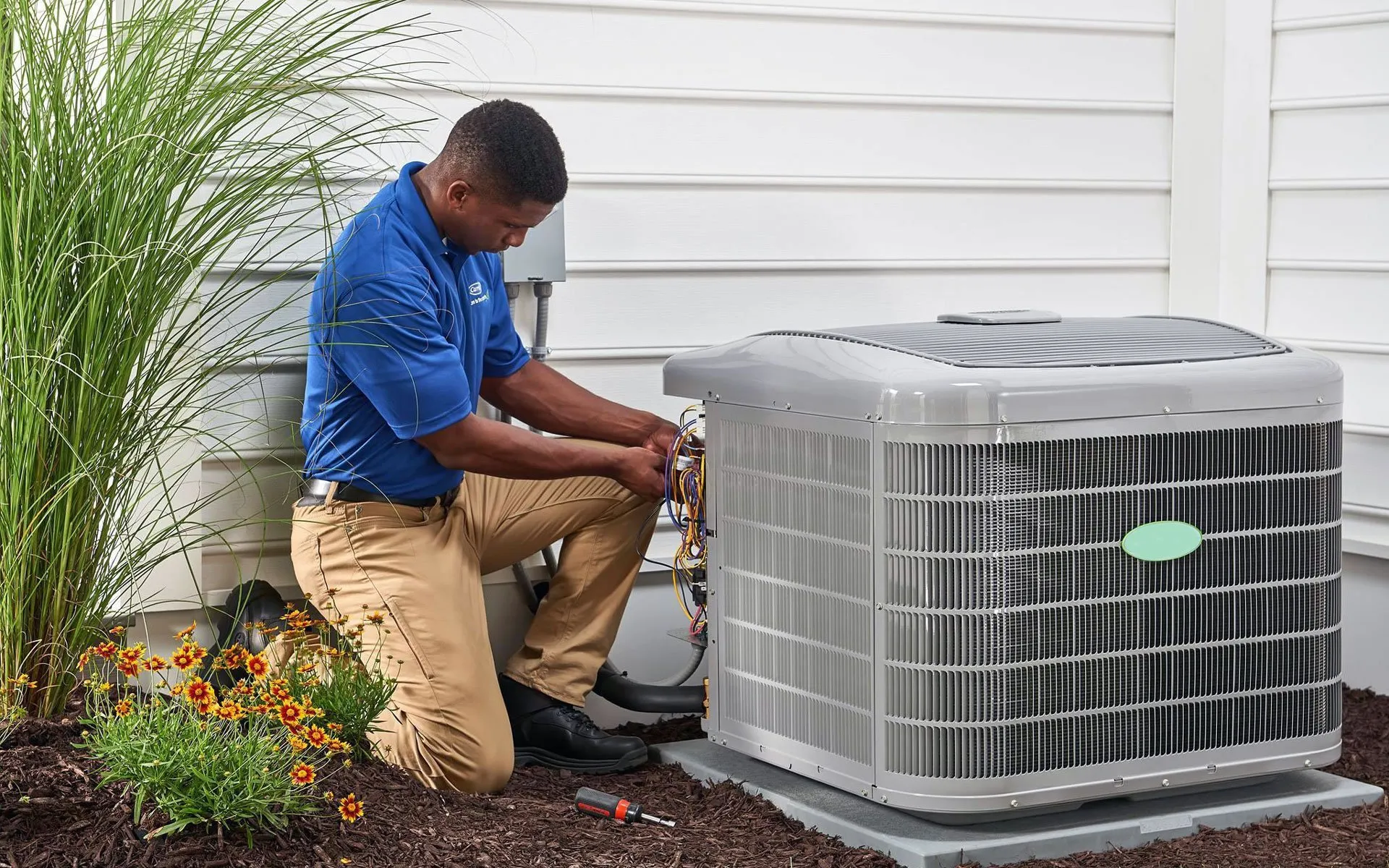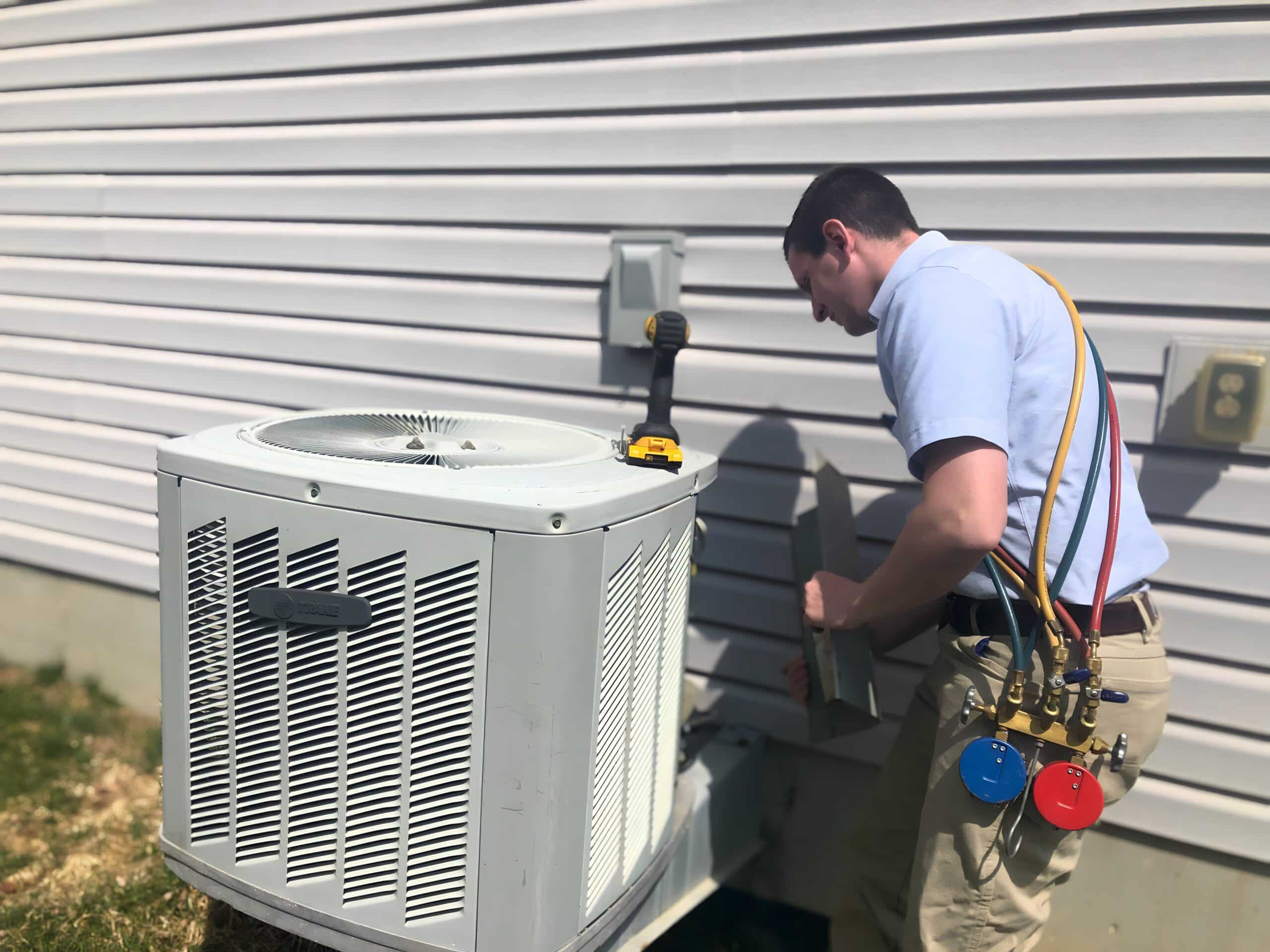Comparing Costs of Repair vs Full furnace replacement
Comparing Costs of Repair vs Full furnace replacement
Blog Article
Choosing Between a Heatpump and Heating System: Secret Considerations for Your HVAC Demands
When examining heating choices for HVAC requires, the choice between a warmth pump and a heater can be complicated. Each system provides distinctive advantages tailored to details environments and energy effectiveness goals. Understanding these distinctions is important for making an informed selection. Secret factors such as installment expenses and ecological effect further make complex the selection process. Which option absolutely lines up with one's convenience and sustainability choices? The following sections will certainly explore these considerations carefully.
Recognizing Warm Pumps: Just How They Work and Their Advantages
While numerous house owners take into consideration various home heating choices, understanding just how heat pumps function and their benefits can greatly affect their choice. Heatpump operate by transferring warmth as opposed to generating it. In the wintertime, they extract heat from the outdoors air or ground and move it indoors, while in the summertime, they reverse this procedure, cooling down the home by expelling warm outside. This twin capability makes them flexible for year-round environment control.One of the main benefits of warmth pumps is their power efficiency. They make use of considerably less electrical energy contrasted to traditional heater, potentially causing reduced utility costs (heat pump replacement ooltewah tn). Additionally, heatpump have a smaller sized carbon footprint, making them an eco-friendly choice. They additionally call for much less maintenance than standard systems, adding to long-term price savings. Generally, recognizing the mechanics and advantages of heatpump can assist home owners make educated choices concerning their heating and cooling down demands
Exploring Heating Systems: Types, Operation, and Advantages
Heaters can be found in numerous types, consisting of gas, electrical, and oil designs, each with unique operational mechanisms. Understanding these differences is important, as they affect performance and home heating efficiency. Furthermore, heating systems provide various benefits, such as consistent heat outcome and dependability in colder environments.
Types of Furnaces
Heater can differ substantially in style and procedure, with furnaces being a prominent choice amongst property owners. There are a number of kinds of furnaces, each using different fuel resources and technologies. Gas furnaces prevail, leveraging gas to produce warmth effectively. Electric furnaces, on the other hand, utilize electrical resistance to generate heat, usually favored for their uncomplicated installation. Oil heaters, while less typical, are efficient in areas with limited gas gain access to (heat pump replacement ooltewah tn). In addition, condensing heating systems optimize power efficiency by catching and reusing exhaust gases. Each type runs via a system of warmth exchangers and ductwork to distribute warm air throughout a home. Recognizing the distinctions between these furnace types is important for notified a/c decisions
Benefits of Heating systems
For house owners seeking dependable heat throughout cold months, the benefits of furnaces are significant. Heating systems offer consistent heating, making sure even temperatures throughout the home. They are especially reliable in severe cold, typically outshining heat pumps in frigid conditions. Different types, including gas, electric, and oil furnaces, provide flexibility to meet varied requirements and preferences.Furnaces additionally tend to have reduced preliminary installation prices contrasted to warmth pumps, making them an extra accessible alternative for many. Their robust design contributes to a longer life-span, with several units lasting over 15 years with proper maintenance. Additionally, modern heaters are commonly outfitted with innovative innovation for enhanced performance, which can result in reduced energy costs. On the whole, heaters continue to be a reputable selection for efficient home heating.

Energy Efficiency: Comparing Warmth Pumps and Furnaces
When contrasting power effectiveness in between warm pumps and heating systems, the Seasonal Energy Efficiency Proportion (SEER) plays an important function in determining performance. Furthermore, a functional price analysis reveals the long-term financial effects of each system. Understanding these variables can assist home owners in making informed choices concerning their home heating remedies.
Seasonal Power Performance Proportion
Energy performance plays a vital role in the decision-making procedure in between warmth pumps and heating systems, especially when thinking about the Seasonal Power Effectiveness Ratio (SEER) This metric actions the cooling efficiency of heatpump over a whole cooling period, giving a standard means to review performance. Higher SEER ratings indicate greater power performance, converting to reduced power usage and minimized energy expenses. In contrast, heating systems are usually assessed using the Annual Fuel Utilization Performance (AFUE) score, which reflects home heating effectiveness. When contrasting these two systems, property owners must prioritize SEER scores for heatpump, as they straight influence overall power financial savings and ecological sustainability. A comprehensive understanding of SEER can especially influence the lasting contentment and cost-effectiveness of the selected HVAC service.
Functional Price Evaluation
Comprehending the operational expenses connected with heat pumps and heaters is crucial for house owners assessing their alternatives. Warm pumps typically offer greater energy efficiency, converting electric power right into heat with marginal waste. This leads to lower month-to-month utility costs, especially in modest climates. Alternatively, conventional heating systems, specifically gas models, might have lower ahead of time prices yet can incur greater operational expenses over time as a result of sustain rates and efficiency ratings.Moreover, heatpump can function as both heating and cooling down systems, potentially decreasing the requirement for different a/c systems. While initial financial investments for heatpump may be greater, their lasting savings in energy performance can make them a much more affordable choice for numerous households. Mindful evaluation of regional energy prices is important to figure out the very best option.
Installation Costs: What to Expect for each and every Heater
Setup prices for heating unit can vary significantly between heat pumps and heaters, influencing house owners' choices. Heatpump usually have greater ahead of time Learn More Here installment expenses, normally ranging from $3,500 to $8,000, relying on the unit size and complexity of setup. This consists of the outside unit, interior handling system, and necessary ductwork adjustments. On the other hand, furnaces tend to have lower initial expenses, balancing between $2,500 and $6,000, which can be appealing for budget-conscious house owners. Nevertheless, setup costs can enhance if substantial ductwork is required.Moreover, the selection of gas type for furnaces-- natural gas, gas, or electrical-- can likewise influence installment expenses. While heatpump provide power effectiveness, their first investment might discourage some purchasers. Inevitably, evaluating installation costs along with long-term cost savings and effectiveness will certainly assist home owners in making informed decisions about their heater.
Climate Considerations: Which System Carries Out Better in Your Location
How do climate problems affect the effectiveness of heater? The efficiency of heat pumps and heaters can vary significantly depending upon the local climate. In modest climates, heatpump succeed by effectively moving warm from the outside air, making them an energy-saving choice. Their effectiveness lessens in exceptionally chilly temperatures, where they might struggle to draw out enough warm. Conversely, furnaces, especially gas designs, offer constant and reliable heat despite outdoor conditions, making them more suitable in chillier regions.In locations that experience milder winter seasons, heatpump can operate effectively year-round, giving both heating & cooling. In comparison, areas with rough winters frequently gain from the toughness of heaters. Ultimately, comprehending the neighborhood climate is crucial when deciding between a heat pump and a heater, as it directly affects their operational effectiveness and total efficiency.
Upkeep Demands: Long-Term Treatment for Warm Pumps vs. Furnaces
While both heat pumps and heaters require regular upkeep to ensure peak performance, their particular needs and care routines vary substantially. Heaters generally need much less frequent interest, with yearly assessments sufficing to look for gas leaks, tidy filters, and evaluate overall performance. Their less complex layout typically enables for uncomplicated repairs.In contrast, heatpump require semiannual maintenance because of their twin function in heating and cooling. This consists of cleansing coils, checking refrigerant degrees, and guaranteeing that both the outside and interior systems work at their best. Furthermore, warm pump maintenance usually includes more detailed components, making specialist maintenance essential.Neglecting upkeep can bring about decreased efficiency and raised power expenses for both systems. Eventually, home owners ought to consider these long-term treatment needs when selecting between a heatpump and a heater, as positive upkeep can extend the lifespan and performance of either system substantially.
Ecological Effect: Picking a Sustainable Heating Choice
The environmental influence of heating systems is a critical examination for house owners looking for sustainable choices. Warmth pumps are generally extra energy-efficient than standard heating systems, as they move heat as opposed to create it, greatly reducing carbon discharges. By utilizing renewable power sources, such as air-source or geothermal heatpump, property owners can better decrease their ecological footprint.On the various other hand, gas heating systems send out greenhouse gases and add to air pollution, though they commonly supply higher heat result. Developments in technology have actually led to the development of high-efficiency furnaces that minimize emissions.Ultimately, choosing a heating system entails evaluating efficiency versus ecological impact. Homeowners are encouraged to review neighborhood power sources and incentives for sustainable systems, ensuring a choice that straightens with both individual comfort and ecological obligation. The decision impacts not just immediate comfort however also lasting sustainability and ecological wellness.
Frequently Asked Concerns
For How Long Do Warm Pumps and Furnaces Commonly Last?
The life expectancy of heatpump generally varies from 15 to 20 years, while heaters can last in between 15 to thirty years. Normal upkeep significantly influences their durability and performance in offering home heating solutions.
Can I Make Use Of a Heatpump in Exceptionally Cold Climates?
Heatpump can run in very cold environments, however their effectiveness reduces as temperatures decline. In such problems, supplemental heating sources might be required to preserve comfortable interior temperatures and assure peak performance.

What Is the Noise Degree of Warm Pumps Versus Furnaces?
The sound degrees of warmth pumps and furnaces vary considerably. Usually, warm pumps operate even more quietly than traditional furnaces, making them better for those sensitive to appear, while furnaces might create louder functional noises throughout heating cycles.
Are Heat Pumps Suitable for Both Heating & Cooling?
Heatpump are without a doubt appropriate for both heating and air conditioning (ductless mini splits). They function by moving warmth, offering effective temperature control year-round, making them a versatile choice for homeowners seeking an all-in-one HVAC option
What Dimension Heating Unit Do I Required for My Home?
Determining the suitable dimension heating unit for a home requires examining variables such as square video, insulation quality, local climate, and the home's design. Consulting an expert can guarantee an exact analysis and excellent convenience. Warm pumps generally supply higher power efficiency, transforming electric energy right into warm with very little waste. In modest environments, warm pumps excel by effectively moving warmth from the outside air, making them an energy-saving alternative. Conversely, heating systems, especially gas versions, give consistent and dependable warmth regardless of outside conditions, making them more effective in chillier regions.In areas that try this out experience milder winter seasons, click to read warm pumps can run efficiently year-round, giving both home heating and air conditioning. Warmth pumps are usually a lot more energy-efficient than conventional heaters, as they transfer warmth rather than create it, substantially decreasing carbon discharges. By making use of sustainable power sources, such as geothermal or air-source warmth pumps, homeowners can additionally decrease their ecological footprint.On the various other hand, all-natural gas heating systems send out greenhouse gases and add to air contamination, though they usually offer higher warmth result.
Report this page